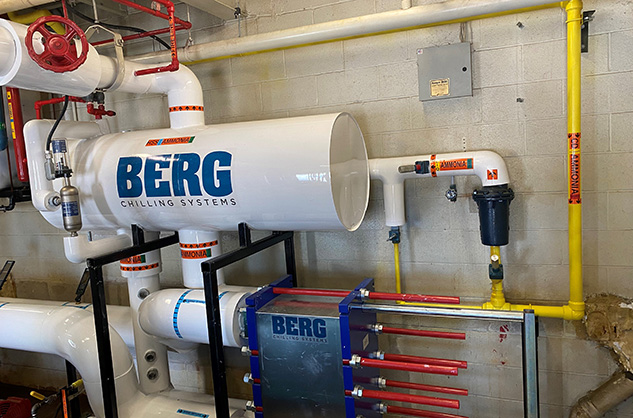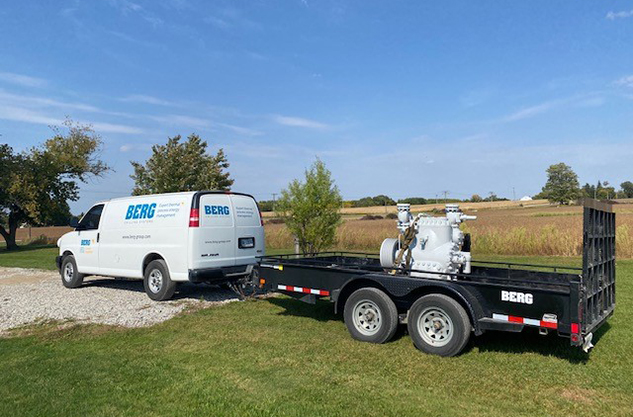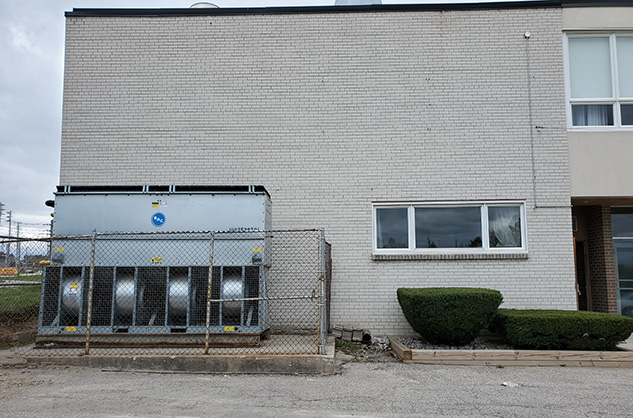Keeping all ammonia refrigeration units maintained and properly inspected will keep your equipment running properly and also avoid any leaks or emergency situations.
Ammonia is highly hazardous and corrosive to skin, eyes, and lungs. Being exposed to as small a level as 300 ppm (parts per million) can cause a serious health crisis or even death. Ammonia is a flammable substance when exposed to air concentrations of 15 to 28 percent, and when mixed with lubricating oils, the range of flammability increases. In an enclosed space where there is an ignition source, or if any vessel containing anhydrous ammonia is present and exposed to fire, an explosion can occur.
Luckily, the odour of ammonia can be recognized at 20 ppm and most people will evacuate when it is sensed. Working around ammonia requires proper training and ongoing caution. Part of maintaining a safe workplace is ensuring that the equipment is properly cared for and all possible safety hazards have been addressed.

Keeping an industrial refrigeration logbook is important for a number of reasons.
The beginning of each shift should include a system log entry and daily inspection of all ammonia refrigeration equipment. The System Log checklist that is provided should be followed by all operators daily. Also, each independent ammonia refrigeration unit must have a separate digital or hard-copy logbook to record observations of the normal operating conditions of the ammonia system.
Record every 4 Hours Daily:

The compressor acts as the heart of your industrial refrigeration system. It works by constantly moving the refrigerant throughout the system. When a compressor’s function is impaired(due to wear and tear or improper maintenance), it can pose serious risks and be an expensive repair. The compressor motive power should be serviced at a minimum of at least every 3 months. For reference, use this mechanical refrigeration checklist to keep on top of monthly and annual maintenance tasks.
Quarterly:
Annually:
A visual inspection should take place weekly to ensure the ammonia refrigeration system is running properly. During this inspection, the external appearance of surface vessels, heat exchangers, and the insulation on each of these items should be noted for anything outside normal operation. Each inspection requires a report in the system log, and repairs should be scheduled whenever there is an abnormal finding.
Weekly:
Weekly:
Monthly:
Bi-Annually:
Weekly:
Monthly:
In addition:

Regular maintenance and mechanical inspections will ensure equipment remains safe and reliable and helps to minimize the risk of ammonia accidents. Keeping proper documentation of inspections and tests is a critical step in everyone’s ability to identify risks, maintain equipment function, maintain compliance with safety requirements, and schedule necessary repairs.
Adherence to an inspection and testing schedule is the best way to ensure equipment is running safely and effectively. Operators must be knowledgeable in the proper maintenance of the unit so they can identify critical points on the system that may be susceptible to corrosion, expansion and contraction, damage, leaks, or exposure to weather and the elements. Based on the results of each inspection, factors such as the identification of deficient components, the remaining life of the unit, or levels of corrosion can be determined and remedied.
A system that is not properly inspected or maintained can equal lost revenue, increased downtime, and expensive repairs. Relying on experienced refrigeration professionals and industry-trained personnel can help identify potential risks and determine a plan of action and inspection schedule for each system.
Maintenance services from Berg Industrial Service. will keep your cooling units in excellent working order and find potential issues before they become big problems. Our team of experienced industrial refrigeration installation technicians work to deliver maintenance that meets the needs of your company specifically.
Are you ready to schedule an ammonia refrigeration inspection? Call us today to get started.